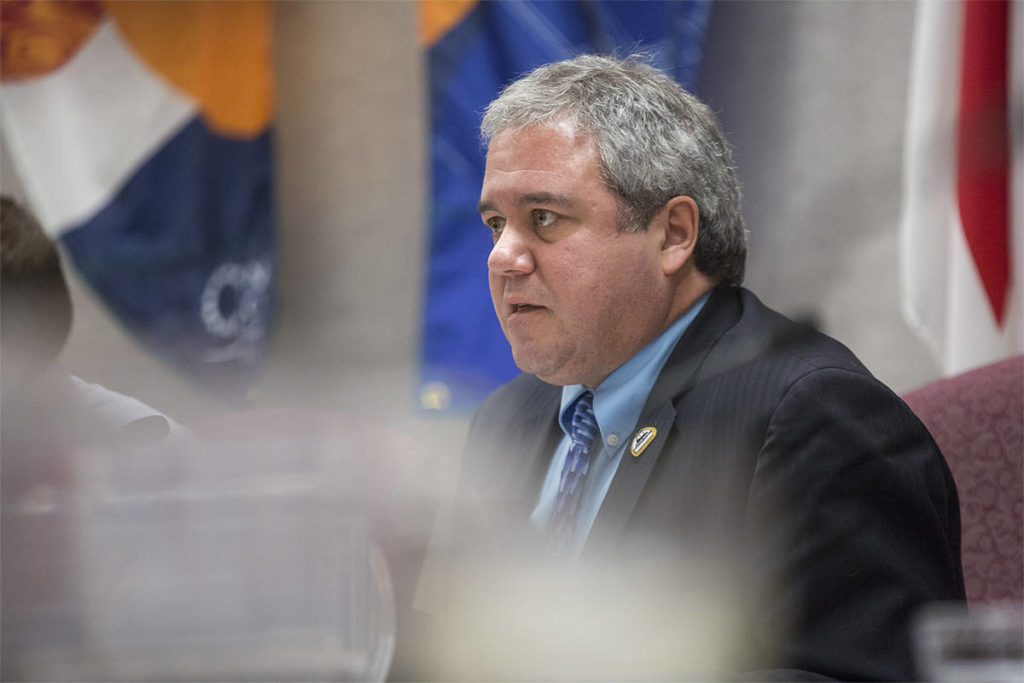Whitehorse’s mayor is coming to the defence of business owners planning to open a private retail cannabis shop across the street from LePage Park.
The shop, expected to open later this month on Wood Street, has the potential to help address many concerns about substance use in the park, Mayor Dan Curtis said the April 1 council meeting.
“I think this could be part of the solution,” he said after a public hearing report came forward on changes to the zoning bylaw around the private retail sales of cannabis.
The proposed amendments would require retail cannabis shops not be within 100 meters of any park that features a play structure. That leaves LePage Park and Shipyards Park out of the equation for the buffer as those are the only two parks in downtown or Marwell (the only two neighbourhoods where cannabis retail sales would be permitted.)
Brendan Hanley, the territory’s chief medical officer of health, argued during the public hearing last week that LePage Park should be included in the buffer, pointing out cannabis consumption rates for youth in the territory are higher than the national average and higher levels of substance abuse in the Yukon.
Hanley pointed to substance use at the park and the interest in protecting the city’s most vulnerable in making his arguments, making it clear his arguments were not directed at local businesses, but rather in the interest of public health.
Including LePage Park in the buffer would prevent Jordi Mikeli-Jones and her husband Jeremy Jones from opening up the cannabis shop they’ve been planning for years. The couple is renovating 211 Wood Street to open the shop.
They addressed council at the hearing, noting the extensive security measures they plan to take.
Video surveillance, security systems and strict regulations around who could enter the store are in the plans. No one under the age of 19 would be permitted inside and anyone found consuming any store products nearby — in the park, for example — would be banned from the store.
Curtis pointed out the business owners have plans to address security, check IDs, and provide training and education.
The shop would also close at 8 p.m. most nights with Friday being the only evening with a later closing time of 9 p.m.
Hanley had also spoke out against regulations that would permit stores to be open until 2 a.m. under the territorial legislation, though that is not part of the zoning changes but is being looked at through the separate business license bylaw process at the city level.
At the April 1 meeting, Curtis said it would be a benefit to have more eyes, or cameras, on the park.
Mélodie Simard, the city’s manager of planning and sustainability, also explained the rationale behind the proposed buffer for parks with play structures, pointing out that kids going to a playground may be unsupervised. Children who are at LePage Park are typically there with adult caregivers for scheduled children’s programming.
Concerns around the buffers proposed in the bylaw were a major focus of many of the comments the city received through the public hearing.
In addition to parks with play structures, the 100 metre buffer would also apply to temporary shelters or properties where substance abuse or counselling services are provided, and between retail cannabis stores as well.
In their submissions, some people argued the 100 m buffer is inadequate and other sites should be included in the boundary — child care centres, homes, tourism businesses, transit stops, in the area of Main Street and the Centre de la francophonie.
Throughout the report, Simard highlighted the city’s interest in balancing the health and safety concerns while also allowing for the sale of a legal product.
“The federal government has determined cannabis to be socially and legally acceptable for sale in Canada. As such, the city and Yukon government are enacting regulations to allow for sale of this legal product.”
Others suggested the city should limit the number of stores in Whitehorse.
Simard said the restrictions in place will limit the number of stores that can be open.
“By restricting the use to downtown and Marwell, as well as including buffers from a variety of other uses, the geographic potential for stores is already limited and could be further limited if council chose to create additional buffer requirements.
“Additionally, the licensing process through the Yukon Liquor Corporation is complex and extensive, as are the building requirements set out in their legislation. All of these factors, including market supply and demand, should serve to limit the overall number of stores operating in the city.”
While Coun. Laura Cabott suggested the city consider greater restrictions so that the Old Town neighbourhood of downtown would be excluded, Simard pointed out much of that area with the exception of some properties on Fifth Avenue is already excluded from retail cannabis sales due to zoning restrictions.
Meanwhile, Coun. Jan Stick was quick to respond to concerns over the smell of pot, issuing a caution that just because a cannabis store is open doesn’t mean customers are going to be walking out of the shop and lighting up.
Cannabis consumption, she said, remains restricted to a person’s home.
Simard put forward the recommendation that council move ahead to the final two readings of the bylaw with some wording changes that would include a definition for “play structure” and make it clear there’s a 100 m buffer between retail cannabis stores. There’s also a proposed addition that would make a list and map of the buffered areas available through the city’s land and building services or planning and sustainability services departments.
Council is expected to vote next week on final readings of the bylaw.
Contact Stephanie Waddell at stephanie.waddell@yukon-news.com

